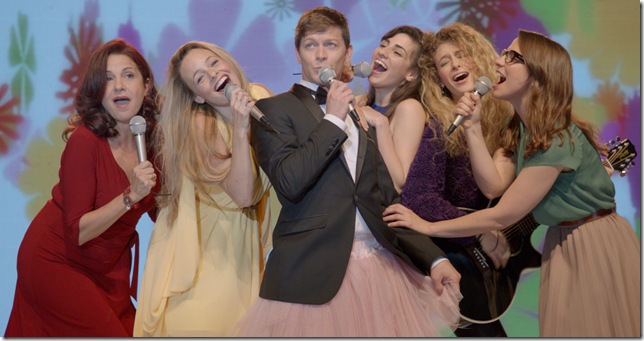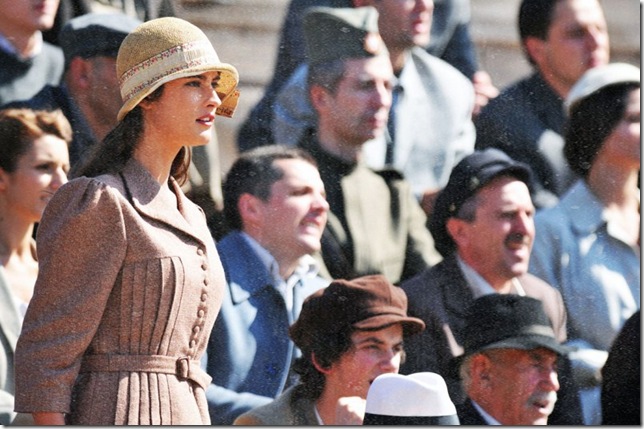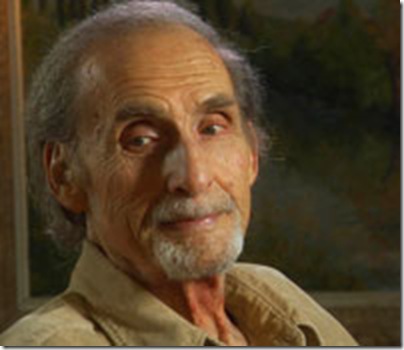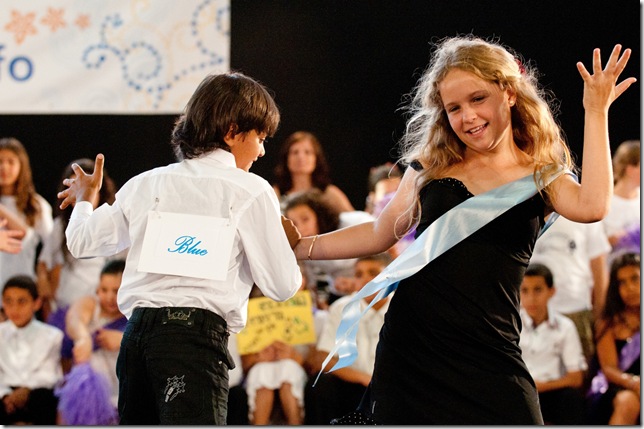Ellen Wedner, a veteran of the arts scene in Miami for two decades, has moved two counties north to direct the Donald M. Ephraim Palm Beach Jewish Film Festival.
Running eleven days from Jan. 16 to 26, the 24-year-old festival will screen 37 films in western Delray Beach and Palm Beach Gardens. Hap Erstein spoke with Wedner about her festival philosophy and the changes she is instituting this year.
Erstein: Why did you decide to leave Miami to run the Palm Beach Jewish Film Festival?
Wedner: Miami is a great festival. I felt very devoted to it, very passionate, but I didn’t see any growth potential. So I’d been looking to either change my career or do something else. But when I saw the job description for this, I thought we might be a good fit. And I think they thought so, too.
Erstein: What will grow the festival?
Wedner: I want to have an emphasis on year-round programming. We’re adding some film courses for small kids, which will culminate in what I’m calling “the recital,” when they show their films. And we’ll do a Jewish arts series. I see these great documentaries about unknown artists — performance artists, filmmakers, whatever, that have a relationship to the Jewish world. And I’ve never been able to screen them, because our film festival, like all the others, we have to make money, too. So I have to keep asking myself, “Is this commercial enough?”
I don’t need Tom Cruise, God knows. I do need something that is going to please audiences, that gets them saying, “Let me come to the next one.”
Erstein: As well as the occasional controversial film that will rile people?
Wedner: Oh, yeah, we’re going there.
Erstein: Initially, you were commuting up here from Miami, right?
Wedner: Well, I was, ’til I saw what that was doing to the car. I own a home in the Design District in Miami. So I rented in Boca, because we both know as we mature — I don’t want to say “age” — that the drive up and down I-95 is a killer. During the festival and at night, I just can’t do it. There are too many films to watch at night.
Erstein: When you first heard about the opening here, what did you know of the Palm Beach Jewish Film Festival?
Wedner: Actually, I did know a lot. First of all, I’ve known (former director) Karen Davis for years. We started in the days when you had to move those 60-pound film reels. So we had a car service to move films between our two festivals, which were both in December, so we could save on shipping.
Erstein: What’s the reputation of the Palm Beach festival among the network of festival directors?
Wedner: I think it’s very good. Even Boston, which is one of the largest festivals, is a year younger than this one. Karen and her committee had a lot of foresight to start this. While Miami is a major metropolitan city and the film distributors really want to go there, I think the smaller distributors and people worldwide — from having dealt with this festival for 23 years — know that Palm Beach County is a real hotbed for films that will interest the Jewish audience.
Erstein: What was your mission assignment for this festival?
Wedner: I think it was to grow the festival. Nothing has gone off the rails here, but I think they understood they had to take it to the next level.
This JCC, with two locations, is one of the biggest in the country. When I interviewed with them, I asked “Don’t you do this?” and “Don’t you do that?” They’ve got two bricks-and-mortar situations; I didn’t have any bricks and mortar in Miami. That means I can show more things in the social halls and get them out there during the year.
Erstein: Does the Palm Beach Jewish Film have a different focus from Miami’s festival?
Wedner: You would think the more controversial, the more edgy would appeal less here than in Miami, but there were things I really wasn’t encouraged to program there. I’ve been able to change that up here. Before I put my résumé in here, I went back and visited their programming, and liked a lot of what I saw.
I think your Cultural Council has a really good take on what makes good art. So with their encouragement and with the JCC looking to reach everybody, it has been a good opportunity to move in that direction.
Erstein: What is your idea of a successful film festival?
Wedner: To me, a festival should do three things. It’s really to entertain, obviously, but also I think you do have to educate and engage. And a really good film, like all good art, does that. You should be able to contemplate it, it should make you think, and even if you didn’t love it or like it, if you’re still thinking about it, then I’ve done my job. And if you’re talking about it with your neighbor, that’s great.
Yeah, I have some rom-coms and some things that will make you feel good, but I also have films that ask the harder questions. I have the ones that people say, “I don’t want to see that,” but you have to do that.
I sort of make it a policy, when we deal with the Holocaust, I try not to show just the history of it. I would hope at this point, Jews and non-Jews alike know something about it. So I’m looking for different angles or I’m looking for repercussions. We have a film called Aftermath, from Poland, we have a film called In the Shadow, from the Czech Republic, that really deal with the ’50s and events right after the war. In both films, it is not just Jews struggling but non-Jews struggling as well.
Erstein: What differences will a frequent attendee of past Palm Beach Jewish Film Festivals notice about this one?
Wedner: You’re going to laugh. I don’t know that they’ll necessarily notice a difference in the films, but I think they’ll notice a difference in the procedures. In the ticketing, I’ve hired a ticketing company that should make it easier for people to get the tickets and get in. It’s all computerized, the tickets and badges will be scannable, so it will go faster, we hope. It will also allow for faster accounting.
Erstein: What about in the programming?
Wedner: I have a great interest in the arts, so we’re going to show Joe Papp in Five Acts at the Norton [Museum of Art]. And we’re doing another film at the Norton called Through the Eye of the Needle, about a woman who told her Holocaust story by creating these fabric panels. And we are bringing a digital representation of her exhibit to the art gallery at the Mandel JCC in Palm Beach Gardens. We also have her daughter coming to speak. And since that’s a short film, 30 minutes, I’ve paired it with The Art of Spiegelman, from I believe the Netherlands or France, about Art Spiegelman and Maus [his Holocaust graphic novel].
The only other really big change — I’ve lived in South Florida long enough to know that none of us loves to drive. So rather than showing different films in different theaters, almost every film is programmed in both the south at the Frank Theatres at Delray Marketplace and in the north at the Cobb Theater downtown in Palm Beach Gardens. So people can see them in the area that best suits them.
And we’re opening at the Cohen Pavilion at the Kravis Center with When Comedy Went to School.
Erstein: Did you travel to many festivals in search of films for Palm Beach?
Wedner: Well, I went to Tribeca in April, a trip I was already scheduled to take. And I got a film there, a documentary called Dancing in Jaffa, which the audience went nuts over. And we got the man who is the focal point of the documentary to come for the screenings. I think that’s going to be lots of fun.
Honestly, in this day and age, I don’t know if (traveling to distant festivals) is as necessary as it was. We have created a Jewish film database, just for festival directors to use, recommending what went well, what didn’t.
Erstein: So where did this year’s films come from?
Wedner: A lot are from the network. I just had another festival director write me to (ask) what’s good, what do you recommend. And honestly, when you’ve been doing this for 12 years, a lot of the distributors write you to try and sell you their films. And it’s distributors trusting you to know you’re going to honor their work, that you’re not going to show it more times than you contracted for, that you’re not going to give out hundreds of copies, that makes a difference.
Erstein: What is your definition of a Jewish film?
Wedner: There’s a lot of debate about that and each festival does it their own way. I don’t necessarily care if the director is Jewish. I think one of the fondest Jewish films we have in our lexicon is Fiddler on the Roof. And [director] Norman Jewison was not [Jewish.]
In Joe Papp in Five Acts, there’s only one mention in the film if he’s Jewish, but here’s a man who changed the art world, that changed the way we look at the theater. He finally owned who he was, so we need to own that, too.
So in different cases, it’s different things for me. I’m not an ultra-religious Jew, but I’m certainly a cultural and traditional Jew. So for me, what I look at is whether it is about family, is it about a North American experience, is it about the greater world, where one of the tenets of the Jewish faith is to repair the world. Is it something that we as a people believe in?
I want this festival to be accessible to everyone, so if you’re from the Czech Republic and you see that I have this wonderful film noir thing, In the Shadow, I want you to feel that you can come to that because maybe you want to hear the Czech language spoken. I want you to feel comfortable to come to that. This is not an insular festival. I hope it isn’t.
Erstein: What do you look for in an opening-night film?
Wedner: A crowd-pleaser. I want to make you feel good and walk out and say, “Wow! This was a really good film. I want to come back and see more.” I want to make it a really good experience. I want you to have fun. It’s not the night for the edgiest, most controversial, hit-you-in-the-face film. I want you to have a good time.
I knew I’d been hired here, but I hadn’t started when I first saw When Comedy Went to School. Nostalgia is a strong pull for so many people. This cried out “opening night film” to me.
Erstein: And for closing night, do you look for something different?
Wedner: No, again I want to make you feel good. I am closing — and how I’m going to run between theaters in just an hour, I don’t know — with the same film in both theaters. The reason is I want everyone to have the same closing night experience. I’m closing with a great film from the Netherlands called The Zig-Zag Kid. It has Isabella Rossellini as a chanteuse singing, “Whatever Lola Wants,” and also playing a grandma. It’s just a really good, up film. And I think it’s going to leave everyone saying, “Wow, I’m going to come back next year.” 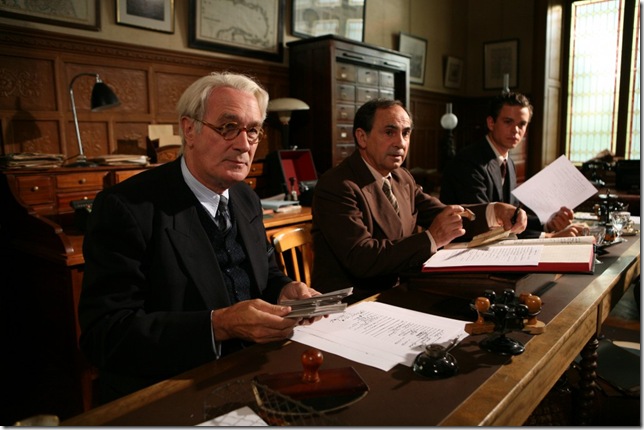
Erstein: Do you have a lot of commitments from the filmmakers to come and talk about their films?
Wedner: I love filmmakers, I bring a lot of filmmakers to my festivals. It’s just what makes a film festival unique. I am bringing Pierre Dulaine, the focal point of Dancing at Jaffa. I have a film called Disobedience: The Sousa Mendes Story, about the Portuguese diplomat. And I have the man who runs that foundation, which produced that film. He was a diplomat who signed 30,000 visas who got the people out, even though the Portuguese government was “neutral,” but they sympathized with Hitler. So I have the survivor, who was 5 at the time, who lives in Boca Raton, and the head of the foundation coming.
I have a film called The Sturgeon Queens, about the fish store Russ and Daughters in New York, I have that director coming. I have Sukkah City, which is another documentary about the New York art project, and I have that director coming. I have the director of a great film shot in Macedonia — which you wouldn’t think was a hothead of film or Jewish film. He actually lives in L.A., thank god. That film has everything, it has romance, it has soccer, it’s based on a true story and it’s just really great.
We have The Last White Knight, which is a film about Delay de la Beckwith, a Ku Klux Klansman whose father shot Medgar Evers, and who had a run-in with this civil rights worker from Canada in the ’60s. The director of that film is coming. We’re working with the African-American community to get the churches in so we can have a dialogue.
I think we have about six directors coming. I think you are going to see that these directors appearing here helps make for a rich, layered festival.
Erstein: Lastly, Ellen, why is a Jewish film festival important? Why should everyone, Jewish or not, attend?
Wedner: South Florida is a world of diversity in all different ways. In ages, in nationalities. The immigrant experience is all over South Florida, not just in Miami. We all come from somewhere else, in essence. That’s just who we are.
At the Jewish Film Festival, there’s something for everybody. It’s really a smorgasbord of film, as crazy as that sounds. Some of these films get released, but some of them never, ever do. So this may be your only opportunity to see a film you may fall in love with.
PALM BEACH JEWISH FILM FESTIVAL, Thursday, Jan. 16-Sunday, Jan. 26. Frank Theatres at Delray Marketplace, 14775 Lyons Road, Delray Beach, and Cobb Downtown Cinemas, 11701 Lake Victoria Gardens Ave., Palm Beach Gardens. General admission: $10, mornings and matinees. $12, evenings. Festival passes; $118-$136. For information, call (561) 736-7527. See the entire schedule of 37 films at http://www.palmbeachjewishfilm.org/.
